Writing Advice:
The story of why I decided to quit my day job and become a fulltime writer / blogger
PLUS: detailed analysis of 11 different ways I earn money from writing and blogging

In October 2011 I launched this website. In January 2016 I resigned from my job. On February 29th 2016, I worked my last day in the office. On 1st of March 2016, I became a fulltime writer.
Now, it’s the summer of 2017. Over a year has passed since I quit.
In this post, I will talk about my journey so far:
This is a long resource - I inadvertently went all Ben-Hur while writing it. So, to make the information easier to navigate, below are some quick links that will take you to the sections of the post you are most interested in. Because it's so epic, the post is divided into 2 main parts.
PART 1: the first section is quite personal, and talks about why I gave up work.
why I gave up my job – the lifestyle of a fulltime writer – my mobile writing retreat
how I structure my writing day to maximise output
PART 2: the second section is more practical and talks about the different ways I make money from writing and blogging.
how to make money blogging – developing a website audience
11 ways to make money writing and blogging – conclusion
I used to work in digital marketing. I was the Operations Director at Strategy Digital, one of the UK’s leading digital and content marketing agencies. The company had a large team of writers and bloggers, which is how I originally became involved in the business. I started there as a freelance writer in 2010.

In June 2015, SD was acquired by Fatmedia, an award winning digital agency that undertake website design and digital marketing for their clients. After the acquisition, I worked as Operations Director for Fatmedia.

The decision to give up my day job was incredibly hard to make. I’d been considering resigning for over two years prior to handing in my notice. There were a few reasons why.
First, the obvious one – the thing that stops most people from doing what I’ve done. The money. I was on a good salary. It gave me security and I enjoyed the luxury of having some disposable income. I also benefitted from generous paid holiday / vacation time, a pension, staff parties and social events – it was a good job package. SD and Fat were good companies to work for.

Me at work, taking the job very seriously (we used to do a lot of dress-up days for charity)
Second, I liked the team I worked with – they really were a lovely bunch of people. I’m still close friends with many of them now. Christie is in my writing group and critiques my stories. Lukas has designed some of my book covers. Steph is an incredibly supportive friend who kicks me up the ass when I need kicking up the ass... I could name all of them. I’ll stop there. They know who they are.
Third, I found the ever-changing world of digital marketing interesting. It’s an exciting industry to work in. It allowed me to work on many projects, my favourite of which was sending bacon into space. Yes, you read that right. We sent bacon into space. Here’s the proof:
Me, Dave, Kath and Pete, sending a bacon roulade to the edge of the Earth’s atmosphere
The video was edited by the legend that is Jake
What other job allows you to get paid for doing mental stuff like that? It really was a lot of fun. I learnt tonnes about digital marketing during my time at SD and Fat.
My role was time consuming and exhausting. I was working anything from 40 to 60 hours a week. A lot of the job was office based and, while flexible to a certain extent, was still governed by core working hours (9 ‘til 5.30, which sometimes became 8 ‘til 7).
On top of that, agency life can be quite stressful. Clients can be lovely. They can also be demanding. This puts pressure on staff which can make the working environment intense, especially if things go wrong.
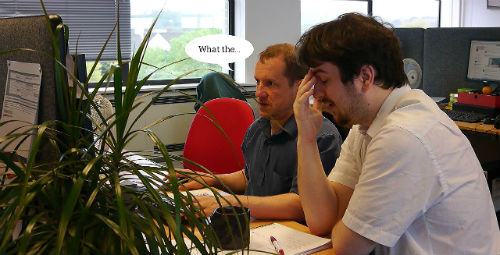
Me and Andy, experiencing a brown-trouser moment with a client's PPC campaign
The lack of time, and feeling drained after long working days, meant my writing was suffering. I was writing, but not as much as I wanted. I was also running this blog, which was taking up to 20 hours a week on top of work. Looking back, it’s amazing I found any time to write fiction.
Because of all of the above, my lifestyle started to have a detrimental impact on my health.
I was eating out a lot with work, entertaining clients, organising staff socials, drinking too much, eating too much convenience food… I didn’t really have time to think about my diet, shop wisely and cook sensibly. I put on a lot of weight. I started getting a lot of migraines, suffering from gout (the most incredibly painful thing I’ve ever experienced – think toothache x 100) and, in all honesty, felt like I was burning out.
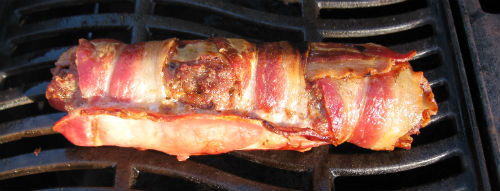
A delicious, but somewhat unhealthy, bacon roulade
On top of that, I was having issues in my personal life that exacerbated the stress I was under. My health was suffering. I could see it: I was heavier than I’d ever been. And I could feel it: I was tired, sleeping badly, uncomfortable, unfit and generally felt like shite.
I went to the doctor for one of those ‘you’re over 40, you should have a health-check’ examinations. I was told I was obese and that my blood pressure was high. I knew I was overweight, but was surprised to be categorised as obese. And the blood pressure result scared me. It gave me the motivation to make tough decisions and change my lifestyle.
You only live once, right? I didn’t feel content. I wasn’t doing what I wanted with my life. I needed to pursue my passion. It was time to instigate change.
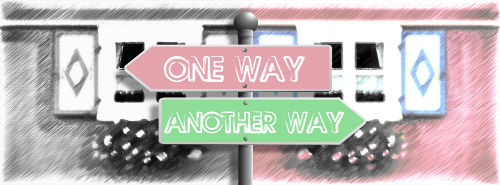
So, after six years of working at SD and Fat, I decided to take a huge risk and leave work before my blog and writing were providing an income I could survive on. Am I brave? Or insane? Probably a bit of both…
Most of the real-life stories I’ve read on this subject matter involve people quitting their day jobs AFTER they have a sustainable income from their writing. Very sensible... Meh. I wanted to make my blog and my writing a living as soon as I could. The only way I could see of achieving that was to commit myself to it 100% and give it all my time and energy. That meant quitting my job. Scary. Really scary. But I couldn’t see an alternative way forward.
Once I’d done it, I knew I’d made the right decision. It’s one of the most satisfying things I’ve ever done. I’d regained my freedom. I was answerable only to myself. I felt happier. In many ways I wish I’d done it sooner. The joy of hindsight…
First I’ll talk about how becoming a writer has changed my lifestyle and improved my health. After that, I’ll talk about the more practical aspects of this lifestyle change – how I make money from my blog and my writing. Basically, I’ll outline how to be a blogger for a living.

In October 2016, for personal reasons, my house was sold and I moved back home with my family. I’m very fortunate – I get on well with my parents and they’re very supportive. Most days I, and/or my brother, turn the dining room into an office. My mum loves this. It really makes her happy. Yes, just the tiniest hint of sarcasm could be attributed to the last two sentences…

David Fielden and Christopher Fielden, pictured in the 1970s, as you may have guessed from the curtains shirt I'm wearing
By moving in with my family, my outgoing expenses reduced considerably. I no longer have to pay all the bills on my own. This means, because of the money generated by the house sale, I now have around two years to make a profit from my writing. I’m using my savings to finance my day to day living expenses as well as investing in my business during this period.
This is a big risk. I don’t have a house, or any investments – just a small deposit for my next property, which is getting smaller all the time. To get back on the property ladder, I have to make money from my blog. At the moment, no one in their right mind would give me a mortgage – my income isn’t high enough. While this is terrifying if I think about it too much, it’s also a great motivator and helps keep me focussed on working towards an end goal – making a living from my writing.
I view my writing as a business. I have to. If I didn’t, it would remain a hobby and I’ll be approaching 50 and still sponging off mum and dad with no income... That is NOT my plan. I’m actively finding ways to monetise what I do every day. Well… most days. Sometimes I just write, but I constantly investigate ways of growing my business.
Adapting to not having my own space took some time. I’m very content in my own company and miss the freedom and independence of living alone. It was also very difficult to take the backward step of moving back in with my parents. In some ways, it feels like a failure.
Most of my friends have their own families, a house, a job, a secure future… They’re often stressed and moan about it. They’re sometimes jealous of what I’m doing. But they do have that security.
The grass is always greener… I look on them as being lucky. They look on me as being lucky. I guess we’re all lucky. We’re just walking different paths in the search of fulfilment. Still, I didn’t foresee my path leading back to my childhood home at the age of 45.
My cat also found it tough. She’s called Lemmy and she’s 15 (yes, she’s named after the lead singer of Motörhead; yes, she’s a girl; yes, Motörhead’s Lemmy was male; yes, it’s confusing). She now shares her space with another cat. Her new feline housemate is called Nelly and she’s 18. So, it’s like two old ladies being forced to cohabit when neither of them wants to. Lemmy is the equivalent of a 90 year old human. Nelly is the equivalent of a human that’s 108. They still try to tear each other’s faces off from time to time, but are beginning to accept one another’s presence. It’s only taken nine months (in human time, 4.5 years). Cats adapt fast.
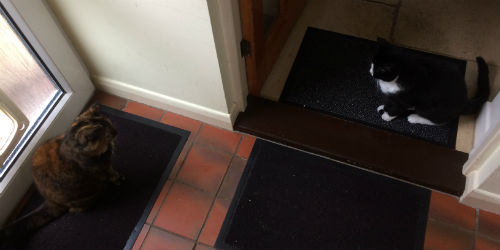
Lemmy and Nelly, remaining calm in surprisingly close proximity, while subjecting each other to feline death glares
Thankfully, I’ve adapted more quickly. That is, in part, due to investing in a mobile office / writing retreat.
After I sold the house, I considered living in a van / motorhome / race lorry. I didn’t want to live with my parents indefinitely and I had a romantic idea of living cheaply in a field with a view that would inspire my writing. Nice.
After researching the practicalities and reality of this lifestyle (I found this resource about living legally on cheap land in the UK very useful and honest), I discovered that pursuing this idyll would be difficult. Even if you own the land you park your vehicle on, there are lots of rules and regulations about living in it. Basically, you need planning permission to stay in one place for any extended period of time. There’s lots of time, cost and paperwork involved with that – it wasn’t viable. The alternative is to move around a lot. I didn’t want to become a gypsy.
So, I decided that having a mobile office was a better idea. This means I can get away when I want, find a view and write without any of the hassle associated with living somewhere permanently.
After looking at lots of vehicles of different shapes and sizes and not finding what I wanted, I decided to buy a van and get it converted to my own specification. I bought a short wheelbase Ford Transit T280 crew van. It was a 6 seater with an area in the back for tools, or band equipment. I used it briefly for gigging with the bands I play in (see the music section of my website for details of all my drumming shenanigans).
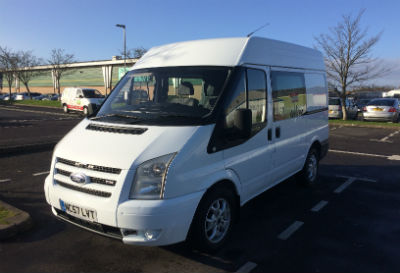
My Ford Transit T280 Crew Van, prior to conversion
I visited a lot of local companies that convert vans into day vans, campervans and motorhomes. While the quality of their work was excellent, the prices were too high for my budget.
In the end, I found a place in Swansea, Wales, called Aztec Campers. Aztec are very competitive on price and a pleasure to deal with. Their workmanship is excellent – see the photos below. If you’re considering getting a van converted, give Tracy a buzz on 01792 586715 or visit Aztec Campers on Facebook.

A picture of the van's new interior in Aztec Campers' workshop
Overall I spent a bit more than intended, but I’ve got an amazing mobile office now and the van would probably be worth around what I paid for it, or slightly more, if I were to sell it. I’m looking on it as an investment in my business.
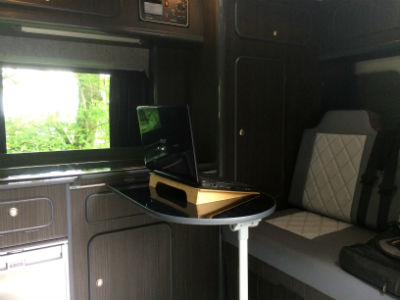
My van's new mobile office interior, on location in the Wye Valley in Wales
Here are a few more details about the van’s specifications. I thought I’d share them here in case anyone was thinking about doing something similar. Feel free to skip to the next section if van conversions aren’t your thing. However, please note that I do reference this part of the post in the section about making money as it contains some examples, so you will learn something later by reading it now :-)

The mobile writing office, pictured at the Llyn Brianne Reservoir, high in the Cambrian Mountains
The van is kitted out with:
The TV took a lot of research. I wanted something decent with good quality picture and a DVD player built in. In the end I got an Avtex L168DR TV. This model had good reviews online and was recommended by a local electronics company as the one to get. I’m including details of that here, because it could save anyone looking for a mobile TV a lot of research time. It’s a good size for a van (not too big, not too small) and offers top quality picture resolution. I bought it from a local shop because it was cheaper than online. Big thanks to Freemans in Portishead High Street. Give Liam a buzz on 01275 848180 – he’s a legend.
The leisure battery is a big bugger and it charges up as you drive around, so I always have power. There’s a mains socket too, so I can charge it up if I visit a campsite that provides electric hook-up.
When I was thinking about all the electrics, I looked at inverters. An inverter allows you to run household electrical goods (like a toaster or computer) from the battery in the van. In the end, I decided not to bother.
The fridge, TV and water pump were all 12volt, so would run off the battery anyway. So the only thing I needed to run from a normal plug socket was my laptop. A decent inverter costs hundreds of pounds. In the end, with a bit of advice from Aztec Campers, I bought a simple travel adapter from Amazon that plugs into a 12volt car cigarette lighter socket and powers my laptop. It cost 15 quid (pounds, non UK dwellers who aren’t aware of the colloquialism ‘quid’). It saved LOADS of money. Again, I only mention it here as it can save you cash if you’re inspired to do something similar.
Rather than waffling on for ages about the van, I’ll stop there. If you have any questions, please don’t hesitate to contact me. I undertook months of research before getting my van converted, so I’ve gained lots of knowledge on the subject. I’d be happy to share.
The van is basically a small home on wheels. As I’m writing this, I’m sitting in it, on the edge of the Llyn Brianne reservoir in the Cambrian Mountains in Wales. Here’s a picture of the view.

The Llyn Brianne Reservoir in the Cambrian Mountains in Wales, UK
What’s not to like about that? The location is isolated, so I’m getting my fix of alone time. It’s sunny. The air blowing across the water is cool and fresh. The view is inspiring. I’ll be here for a couple of days and hope to have the majority of this post drafted before I leave.
NOTE added when building this page on the blog: I succeeded – go me. I did get bitten by midges over 140 times in the process, but hey, that's the price you pay for a view of a reservoir...
One of the main reasons for getting the van was to help me focus my day.
I’m easily distracted. I’m like a tiny fish with brain disease. I sometimes forget what I’m talking about mid-sentence and – oh look, a suggestively shaped cloud that reminds me I must book a doctor’s appointment.
Get it together Christopher…
When I work at home, I’m always online. If an email comes in, I have a habit of dealing with it there and then. Writers who submit to the writing challenges run on my website may have noticed this. I often publish their stories in a matter of hours. Sometimes minutes.
While quick turnaround times might be great for my website users, this working practice isn’t good for my writing. Favouring quick ‘do it now, then it’s done’ tasks, rather than projects that require days or weeks of work – like writing this blog post – can be counterproductive.
Becoming absorbed in more time consuming projects requires focus. Removing interruptions and distractions, like the phone, emails, social media notifications, being in close proximity to other people who ask you a lot of questions etc. is essential.
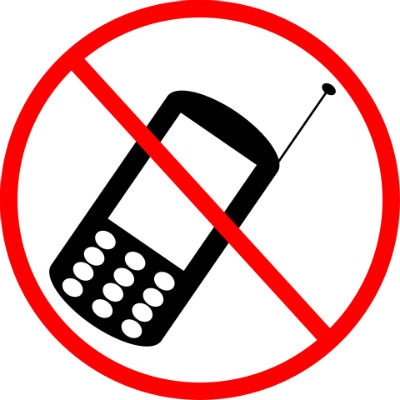
If you interrupt anyone undertaking a creative task, even if it’s just for 30 seconds to ask them a quick question, that interruption can cost them up to an hour in real time. It takes time to get into the mind-set required to create something.
Back in my days at the digital agency, we used to find our team of coders and programmers had the same problem. Being in operations, part of my remit was productivity. We trialled introducing hours in the day when other staff members weren't allowed anywhere near the design and build team – not even into the same room they were in. This meant that, at certain times of the day, the team could work without any interruptions and become fully immersed in what they were doing.
Productivity almost doubled when this was introduced. The coders were happier – constant interruptions often made them irritable as it stopped them from completing tasks. They were then a lot more open to helping other staff members solve problems. Removing distractions and interruptions improved output and working relationships between teams.
Writing is similar. When writing fiction, I become absorbed in what I’m doing. My brain goes into creation mode and a story will begin to form and flow out of me. I become fixated on the characters; who they are, what they are, how they speak, how they interact with each other and react to events, how they’ll deal with conflict in a way that allows the reader to suspend their disbelief and accept a fictional situation as real… As you can see, a lot goes on in my head when I’m in a creative mood.

If you write or draw or create music or paint – whatever activity you undertake – you’re likely to experience something similar. If I’m interrupted, my mind goes to a different place. I can feel it. It’s like one area of my brain is needed to write and another is needed to interact with others. For me to be able to deal with non-creative tasks and interactions, the creative area of my brain needs to be turned off and rebooted. It then takes time for the restart to configure itself and for me to get back into a creative headspace. After an interruption, I often have to go back to the beginning of what I’ve been writing, read it all again to fight to get back to where I was.
I tried breaking habits at home, but found that no matter how hard I tried, my natural tendency to tick things off my to do list and clear out my inbox took precedence. Any interruption meant I’d ‘quickly’ check my emails before I resumed writing. I’d then spend time on tasks that had come in. I always seemed to slip back into this routine, no matter what I did to prevent it.
Part of the reason for buying the van was to force a change in my behaviour. I haven’t invested in mobile internet. My phone has very limited roaming data and my computer has none. My plan is to go away in the van regularly, find an internet café in the morning and deal with emails, website updates, phone calls and that kind of thing – using an internet café on almost a daily basis means I can still turn quick jobs around in 24 to 48 hours (usually), so it’s not too slow.

Me, taking selfies in the Wye Valley with a cuppa, instead of getting on with some writing
Then I can drive up a mountain, or to the coast – go somewhere with an inspirational view. Once in a remote area in the van, there’s nothing to do except make tea, look at the view and write. That’s it. If my mind wanders away from writing, it quickly finds its way back as there is nothing to take me out of that creative headspace. I wanted to force a more productive day out of myself.
I’m pleased to say, it worked.
My first trip to the Wye Valley in Wales was a test. I wanted to try the van out and see how much writing I did. I set off just after rush hour on a Tuesday morning, so at about 9.15am. From Portishead, where I live at the moment, the trip takes around 45 minutes.

A vista from the edges of the Wye Valley in Wales
By 10.30 I was parked up at The Anchor Inn in Tintern, looking at the beautiful abbey ruins, sipping tea and checking my emails. By 1pm I’d done everything I needed to do online. I ate lunch and set off for a wander in the van. By 3pm I’d parked up in the Forestry Commission Car Park by the 365 steps, not far from Chepstow. I wrote. I cooked my supper. I wrote some more. I watched the news. It was all about the elections (yawn – so bored of politics). I wrote some more. I slept.
I woke early, with the birds singing. I ate some breakfast. I wrote some more. I headed home at about 1pm.
During that time, I’d written over 3,000 words. 1,000 was fiction, for a book I’m working on. 2,000 were the beginnings of this blog post. And I’d also planned out a couple of modules for an online short story writing course I’m considering developing on the website.
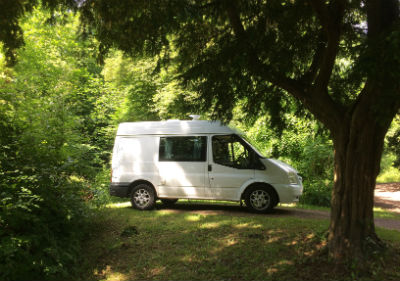
Camping spot at the 365 steps in the Wye Valley, Wales
For me, that’s a good day. An amazing day. I’m not usually prolific. I’m normally pleased if I manage 1,000 words in a day. 2,000 is a rare feat of word spouting. 3,000+… well. It proved to me that I’d made the right choice.
On my second trip, about a week later, I went to the Cambrian Mountains in Wales (mentioned earlier in the post). It takes a little longer to get there – it’s about 2 hours from Portishead.
I drove to Llandovery on a Tuesday, arriving at 11.30am. I got a pot of tea at The Castle Hotel and checked my emails. Then I headed into the Cambrian Mountains, setting up home for 3 days above the Llyn Brianne reservoir. I stayed 2 nights at Tywi Forest view points. And I stayed 1 night at the Rhandirmwyn Camping & Caravan Club Site. It’s located in the foothills of the mountains.
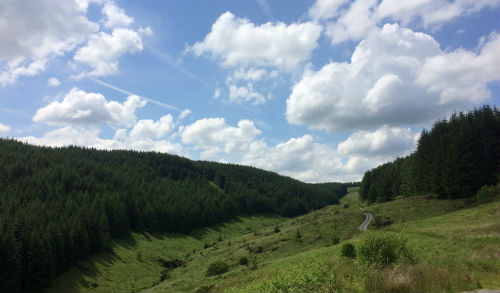
A view from one of the roads that winds through the Cambrian Mountains
Each morning, I’d drive into Llandovery and use the internet. Each afternoon I’d head back into the mountains and write. There is no mobile, internet or TV reception in the Cambrians. It’s a great location if you want to focus without distractions.
I headed home after lunch on the Friday. During this time I wrote 9,000 words. 7,500 were non-fiction (a good chunk of this post) and 1,500 were fiction. Yes, I find non-fiction much easier and quicker to write. It requires less editing. Stories need more crafting and inventing, so are more time consuming. Voice, believability, characterisation, pace, flow… I find this all needs to be considered carefully, so I write and edit fiction more slowly than I do blog posts. Still, this was another productive trip.
As you can see, this lifestyle seems to be working for me. It forces me to focus and break my bad habits. It also gets me out and about, which I love. Will it work as well in the winter? Probably not. But during the spring, summer and autumn, I intend to spend as much time away in the van as I can.
Since quitting work, I’ve also become healthier. I changed my eating habits. I haven’t gone on a diet a such; I just eat less. Specifically, less junk food, fewer snacks, less meat (most notably, 0 kebabs) – I have smaller portions and eat more fresh food. I’ve lost 3 stone (that’s 42 pounds / 19 kilos) in the last 18 months.
I’m going to the gym. Exercise is definitely helping with my weight, but also aiding my fitness, concentration, creativity and general feeling of wellbeing.
My gout is under control. I haven’t had an alcoholic drink since Christmas Day 2016. Losing weight and exercise also help – gout is a symptom of lifestyle, particularly excessive drink, meat, processed foods and other delicious stuff that’s readily available in today’s society. Even things that are regarded as healthy can cause gout – fish, mushrooms, spinach… there is an extensive list of foods and drinks that are high in purines on the Gout Society website. It’s not just booze and offal. I’ve had to give up Marmite. Gutted. I used to enjoy Marmite on toast for breakfast.
Medication is also a big part of controlling gout. Lifestyle changes help, but once you’ve got it, you need meds to help get rid of it. I take Allopurinol. It helps your kidneys process and expel uric acid, which crystallises in your joints when there’s too much of it in your blood. This is what causes the pain – it’s a form of arthritis. Uric acid is produced when your body processes purine.
I’ve completely changed my lifestyle, my eating habits. Everything. I haven’t had a migraine in 6 months. The gout pain is much improved.
My smack habit has got worse, but hey, everyone has to have a vice… JOKING.
In summary, I feel I’ve made the right decision. I’m happier and healthier and I wake up every morning excited about the day. It’s a wonderful feeling.

In this section I’ll talk about how I use my writing and website to make money. I’ll be frank and honest about the challenges you face when trying to make a living from writing and running a blog.
There are a lot of ‘do this and you'll get rich’ style blogs and books out there. Now, these are often useful and I’ve learnt a lot from reading blog posts written in that style. However, I think that sometimes they gloss over how hard it is to find success, even if you understand the basic principals involved in making a business model work.
The information often focusses on the success (I did this and now I make x $ a day / month / year etc.), not how difficult it was to achieve that success in a specific niche and how much stuff went horribly wrong on the journey. This is natural, I get it. The author wants to look like a success, not a failure, so others will look up to them, listen to them and buy their books, courses and advice. But it’s not really a fair representation of reality and how difficult it can be to make a business successful.
One of the things people repeatedly say they like about my book, How to Write a Short Story, Get Published and Make Money, is the honesty I use in the section about ‘making money’.
I talk very frankly about how much I make from writing short stories and how challenging it is to make a living from writing fiction. So I’ve decided to continue that style here. I guess it helps that I'm at a point in my journey where I've yet to make my business fully viable as a job - it forces me to be realistic about sharing money making expectations.
I hope all the information in this section is positive and encouraging, but also grounded in reality and shows you that you’re unlikely to become a millionaire by quitting your job to run a blog.
That said, you CAN make a living from blogging and turn it into an enjoyable and fulfilling vocation.
I sold my first short story in the spring of 2011. I launched this website in October 2011.
When I left work in 2016, I’d already done a lot of work on the blog. I’d developed an audience of writers and the blog was enjoying around 20,000 visits a month.
I’ve written extensively about how I developed the content on my site to attract this audience for Moz, one of the leading digital marketing agencies in the US. Rather than repeat all that information here, it’s easier to link to the posts on the Moz blog. Please see:
The two blog posts are about timeless content. They show you how to develop evergreen resources that your audience will always value and find useful. They also illustrate how this kind of content can grow an audience for your website organically. The posts use my short story competitions page as a case study. This page continues to generate around 45% of my website’s traffic today, so makes a great real-life example.
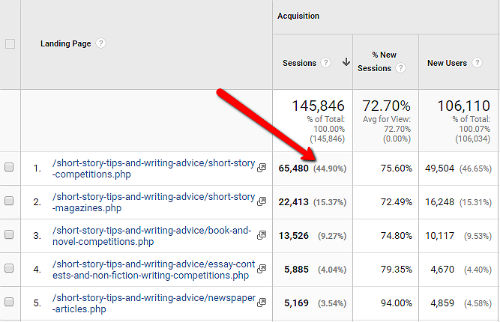
My website's top 5 landing pages in June 2017
Yes, my background in digital marketing definitely helped me develop my website. However, you don’t need years of industry experience to create a successful blog. You just need to understand the these 3 basic principles:
Admittedly, these 3 bullet points simplify the process, but they outline the basic marketing formula I used when I launched my website.

My target audience is fiction writers, primarily authors interested in short stories. I created resources they would find useful. I update the resources regularly to keep them relevant and helpful. I engage with my audience when I generate new content. I tell them about it via my email list and social media.
This post is an example. How come you’re reading it? Probably because you’re on my email list, or you found it on social media. Or you found my site via Google, Bing or browsing with another search engine. This shows you exactly how writing content like this attracts an audience for my blog. If you enjoy the post, you might tell your writing friends about it. Word of mouth helps too.
Since I left work, I’ve added more resources to the site. In 2017 the site has received anywhere from 25,000 to 35,000 visits a month. That’s pretty good growth from the 20,000 it was getting early in 2016. It’s also an excellent level of traffic for a website with only 180 pages. Most high volume websites have thousands of pages. Some have millions.

Graph, showing growth in website traffic since launch in 2011
I’ve generated this increase in visits by investing time in key areas of the site:
Let’s look at each one individually.
This is the largest section of my website. It contains lots of free resources and writing tips for fiction writers.
The writing advice section of the site now contains lists of many writing and publishing opportunities, including short story competitions, flash fiction contests, poetry prizes, book and novel competitions, non-fiction awards, scholarships and short story magazines.
There’s also a lot of advice about books, publishing, self-publishing, editing, how to win writing competitions, how to undertake market research for short stories and much more. I’ve written many of the posts myself based on my real-life experience as an award winning author. I often use my own short stories as case studies. Quite a few of the blog posts have been written by guest writers, all of whom have enjoyed publishing success or are experts in their field. Again, they share real-life experiences for others writers to learn from (if you're interested in writing for me, please see my submissions guidelines).
The writing advice section of my website attracts over 80% of the overall traffic I currently receive each year.
I now run a variety of flash fiction writing challenges on the site. Each challenge highlights common mistakes new writers make. They also support charity.
For example, the adverb writing challenge highlights the overuse of adverbs. Writers are asked to use as many adverbs as humanly possible in a 100 word flash fiction story. Each submission is published. Each time we receive 100 submissions, we release an anthology. Proceeds from book sales are donated to different charities, often in the literary field.
Hundreds of authors have now been published through these writing challenges. Many of the authors that submit to the challenges become engaged, long-term users and advocates of my website.
This section of the website is a recent development – I launched it about six months ago. It’s growing rapidly in popularity and I’ve now published stories by authors residing all over the world. The challenges really are a joy to run.
The To Hull And Back humorous short story competition grows every year. It is now regarded as a prestigious competition and is becoming a respected platform for humorous writing. The competition generates a lot of interest and visits to my website.
You can learn more on the main To Hull And Back competition page. You’ll find a full history of past contests on the results pages. Each year I write about the increase in the number of entries, how I’ve grown the prize pot and plans for the following year.
I continue to develop new content and resources for the website as often as I can. This helps reach a wider audience and means the site remains useful and interesting to my existing users.
Having a lot of visitors to your website is great. But it doesn’t result in you receiving a salary.
So how do you make money? How do you generate revenue and earn a living from your blog and writing?

At the time of writing, I have yet to make enough money to generate a sustainable living from my blog and writing. That said, I do turn a profit. In my first year of working on the blog fulltime, my NET profit was £3,276 ($4,450). Prior to that, I’d always made a loss.
£3,276 isn’t enough to live on. However, any business that makes a profit in its first year of fulltime trading is doing something right. To be honest, I was expecting to make a loss, so I’m happy that a profit was made. Still, I have a long way to go.
£3,276 / 12 = £273 ($345). That’s £273 a month. Could you live on that? No. Me neither.
But things are going in the right direction. In the first quarter of this tax year, I’ve seen an encouraging improvement in turnover.
So, how does my blog generate income?
There are a number of different ways. They are:
And I'm also looking at other ways of making money from my blog.
Let’s look at these one by one.
There are 2 different ways of making money from advertising on your website:
You will probably have noticed adverts displayed on my website. They are located in banners at the top of each page and in different areas on the side bar in each page as you scroll down. If you’re looking at the site on a mobile device, the ads will appear in different locations around the screen, often at the bottom. These adverts are generated by Google AdSense.
Google’s advertising platform is free to use. They tailor the adverts to the individual user. They do this by looking at the user’s search history, browsing habits (for example , what searches they’ve done on Google) and, if they’re logged into their Google account, their personal data (age, gender, location etc.). This helps Google decide what adverts might be of interest to the user. This form of advertising can be very effective, as the user is likely to be presented with adverts they’re interested in.
A self-optimising Amazon advert, that learns what to display as users interact with it
Each time a user clicks on an advert that’s displayed on my website, I receive a small amount of money. This could be anywhere from a few pence/cents to a pound/dollar, depending on the subject matter of the advert, how competitive the industry is and the value of the goods or services on offer. For example, you are likely to make more money from someone clicking on an advert for insurance than an advert for stationery.
The AdSense platform offers you some filters, so you can stop certain types of adverts from showing on your website should you wish to. Gambling is a good example – many bloggers choose to block advertising from this industry as they don't want to be associated with it.
So, you can control what users see to a certain extent, but the controls are limited. You have to place a lot of trust in Google, hoping they show your users relevant adverts that won’t cause offence.
I have received 3 complaints about the Google AdSense adverts shown on my website since I started using them 3 years ago. The first was from a gentleman who felt the advert he’d seen was inappropriate. The second was from a lady who felt the image on the advert she’d seen showed too much exposed flesh.

I replied to both these user’s emails, asking for more detail so I could report their concerns to Google. Neither of them replied to me.
The third complaint was from a user who didn’t like seeing adverts on my website at all. She suggested that I remove the adverts all together as she found them annoying. The content on my website is provided for users to read and utilise free of charge. The website is my living and I have to find ways of generating an income from the posts I write and the advice I share. Adverts are one way of doing this. Would you do your day job for free? I doubt it... The adverts will be staying.
I replied, politely explaining the situation. I outlined an alternative, which would mean putting up a payment wall and asking users for a monthly fee to read the content on my website. I asked her if she would pay a fee if I were to do this. I didn’t receive a reply.
To put this into perspective, the adverts on my site have been viewed over a million times. I’ve received 3 complaints (on average, 1 a year). That’s a ratio I can live with.
If you're allergic to large corporations like Google, there are alternative advertising platforms out there. You can find some good AdSense alternatives here.
You also need to think about where to place the adverts on your pages. Some websites have them littered all over the place, or have pop ups that interrupt the reader, forcing them to undertake an action – click the ad or close it. I prefer a less intrusive approach. Still, the adverts have to be visible or they won’t generate much revenue.
I’ve toyed around with where to display adverts. Because a lot of the content on my website is long, I started using adverts that stick in place as you scroll down the screen. If you’re on a desktop computer, you will see this in the left hand column of this page. When you scroll down the page far enough to see my email sign up form, the form sticks in place with an advert beneath it. They both stay in view as you browse further down the post. When I implemented this, I saw my advertising income increase by around 30%. I also started to receive more subscribers to my email list.
This shows the importance of experimentation and making 'calls to action' visible. I’d advise you to try adverts in different locations on your website and see what is most profitable for you.
At the moment, AdSense generates me anywhere from £70 to £150 ($88 to $190) of income a month.
I also offer businesses the opportunity to buy advertising space on my website for a monthly fee. You can see the detail on my main Advertising page.
I offer a business the opportunity to place an advert on my site that would be shown to my users all the time, in the areas that currently show Google AdSense ads. Because of the amount of traffic my website receives, this could generate them a lot of business if they offer something of interest to a writing community. It also means I can charge more money than I currently receive from Google AdSense for the advertising space.
To date, I haven’t sold the space to any businesses directly. I’ve only used AdSense. I have been approached by businesses, but have turned down their advertising requests. Why? Because they've all been essay writing service providers.
Essay writing is big business. You can tell by the large number of websites out there that offer this kind of service. The services are relevant to my website, because they're to do with writing. However, on a personal level, I’m not convinced that essay writing services are ethical. They basically offer a way for students to cheat, by providing a service that writes a thesis or essay for them.
Now, I’ll admit, I was tempted to accept the business I was offered. As I’ve said, I’m not making much profit at the moment. The adverts the firms wanted to place were the banners at the top of each page and would have generated £249 ($315) of income a month. I would still have been able to display Google AdSense ads in the side menus on each page. So, it would've been lucrative.
However, I like to run my blog as openly and honestly as I can. If I were to actively promote services that I don’t believe in on every page of my website, this would undermine the ethos of my business. It wouldn’t be a good trust indicator for my users. So, after some deliberation, I rejected the adverts.
At least when I’m declared bankrupt my conscience will be clear…
Seriously though, I’m glad I made this decision. It adds integrity to what I’m doing. I’m investing time in this for the long-term, not short-term quick wins.
In summary, whether you like adverts or not, they are how most bloggers and providers of free internet content generate at least some of their income. I’m of the opinion that if you receive something free of charge, you should be able to tolerate an advert or two (don’t even get me started on users who download software to block adverts…). So, I’m quite happy using adverts on my site to generate one of my income streams.
This is how most successful bloggers say they generate the majority of their income.
How does affiliate marketing work? Basically, like this:
If you sign up to an affiliate program, you get paid each time you send a user to a business’s website and they make a purchase.
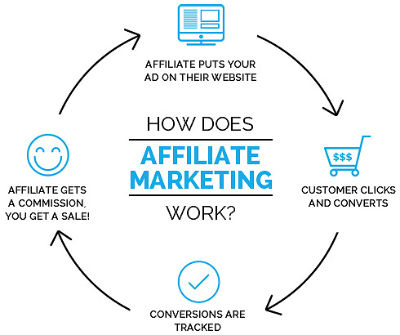
Image by Search Engine Visibility
Let’s use Amazon as an example.
I’m a member of Amazon’s affiliate program (UK) and associates program (US). I place special links on my website to Amazon’s products. If a user clicks one of my affiliate links, Amazon will recognise that the user has come from my website. If the user makes a purchase within 24 hours, Amazon will pay me a small percentage of the profit from the sale. That could be for any product – it doesn’t have to be for the specific product I linked to. I sent them the customer, therefore I get a cut, no matter what they buy.
Further up the post, in the section where I’ve talked about my mobile writing office, I linked to the Avtex TV I bought for the van. I’ve used an Amazon affiliate link. If a user clicks that link and then makes a purchase on Amazon, I’ll receive some money. Amazon identify me via my affiliate ID, which is contained in the URL I link to.
You can also use product display ads, like this one
Sounds complicated? It isn’t, I promise you. You can get set up as an Amazon affiliate within a day. The affiliate system undertakes all the technical wizardry for you. All you have to do is search for relevant products and copy and paste the links Amazon generate onto your blog.
This can be a very lucrative way of making money from a website.
I’ve seen affiliate programs offer anything from 5% to 50% of the sale price of goods. Some businesses will pay you if a user makes a purchase up to 6 months after you first sent them to their website. It depends on the product or service on offer.
Amazon pay an affiliate commission for purchases made within 24 hours, but that’s due to their business model. People tend to go to the site and buy quite quickly. And most people already have an Amazon account – or are at least aware of the brand – and could visit the site for any number of reasons as they sell so many different products. You can find a good explanation of how to get the most out of being an Amazon affiliate on the Niche Pursuits website.
If a purchase is made from a business that sells something large and/or expensive, (like a writing course for example) it can take the user longer to decide whether they want to make the purchase. So, the affiliate commission can be paid months after you first sent the potential customer to the website.
To help illustrate this further, here are couple of examples of businesses I work with as an affiliate.
I work directly with Dave at Kindlepreneur. He makes software for authors. His main product is called KDP Rocket. It helps authors create successful advertising campaigns for books on Amazon. If I send a user to his site and they purchase his software, I receive a cut of the sale price.
Dave's affiliate program is perfect for me. The products and software he produces are very likely to be of interest to my readers, as many of them are self-published novelists looking for ways to sell more copies of their books.
He also produces free resources, like this video course, that teaches you about how to advertise your books on Amazon. The course is free, so I don't receive anything for letting my users know about it. However, if one of my website users does the course and goes on to purchase Dave's software, I will receive a commission for the sale.
I also work with Marvin and Lauren at Inkitt. They run a popular novel contest that offers an amazing prize - Inkitt publish the winner's book and then conduct an extensive marketing campaign, that is likely to make the winner an Amazon bestselling author.
Each time I send them a user that uploads a novel they pay me a commission. The user signs up for free, so there’s no percentage involved – it’s just a flat fee. This works very well and I generate a lot of leads via the book and novel competitions lists on my website.
I’m very happy working with businesses like Kindlepreneur and Inkitt (I was telling my website users about both these businesses long before I started working with them as an affiliate).
This is because I know they offer great value to authors through their market leading offerings. This is proved, because my website users go on to buy their products and use their services. For example, I’ve corresponded with writers that have uploaded their books to Inkitt after finding them through my website. They've all been pleased with the results. Their work is being downloaded and read.
Inkitt also talk very openly about their success stories with the authors they publish after winning their competitions. One of their authors, Simone Elise, wrote for my site, proving that Inkitt's business model works well.
In short, I’m happy to be associated with businesses that have a unique offering that is of value and interest to my website users.
Affiliate platforms match businesses with bloggers. They operate by building networks of businesses that offer great products / services and bloggers who provide great content. This means the businesses don't have to set up their own affiliate programs, saving them a lot of time and money, and the bloggers can advertise the different business's products easily, knowing their commissions are tracked and collected.
I’ve found that LinkConnector offer a good affiliate platform - you can
Join the LinkConnector Network here. LinkConnector have agreements with businesses like WritersDigestShop.com and Writers Store
.
Writers’ Digest offer loads of resources for writers. They also sell books and writing courses. Writers Store provide software for writers. Both of these businesses are suitable for my target audience, so I use LinkConnector quite regularly. I also work as an affiliate for LinkConnector themselves. If you click on the link at the beginning of the previous paragraph or the image below and sign up, I receive some money.
Yep, you can use affiliate links everywhere. As long as they’re relevant to the content you’re creating and offer value to your users, you’re likely to make some money.
I’ve actually signed up to over 20 affiliate platforms and I’m still investigating the best ways to make money by using them. Many bloggers say that ‘best of’ lists, reviewing a variety of different products, work best. I’ve tried this with my Best Books on Writing resource. The links to each book are affiliate links, so I get paid if people click on the links and make a purchase. However, the page generates me very little income. It doesn’t receive that many views as the target search terms, like ‘best books on writing’, are quite niche. And the profit margin on each book is small, so if users do make a purchase, I only make pennies.
If I were to concentrate on products that command a higher price, or were of interest to a wider audience, I could make more money. This is why I’m actively investigating software for writers. The cost of software tends to be high, so there is more potential to make a decent commission. And it’s relevant to my website’s audience – it is likely to be of interest to them.
There are lots of businesses that you can investigate working with. I’m just starting out on this journey. For example, I’m currently talking with a business that offers writing courses and writing retreats. If that comes off, it will be of interest to my audience and I might make some money from it.

I will also mention that some of the affiliate programs you try won’t work well. For example, I’ve signed up as an affiliate with First Writer. They run short story competitions and offer lots of writing advice to their users. Therefore, I thought their program could work well for me.
I currently list them in the ‘featured’ section on my short story competition lists page. This resource receives between 10,000 and 16,000 views a month. I receive a small commission from First Writer each time a user signs up with them. At the time of writing, First Writer have been featured on my website for two months. So far, I’ve earned less than £5 from their affiliate program. Due to the exposure they're getting on my website, I hoped the income would be higher.
Now, I still think that what they offer is a really good fit for my audience. But, as yet, not many of my users have signed up with them or entered their short story competition. This is likely to be as much about where I have their information listed on my website as what they are offering.
There are lots of affiliate platforms you can sign up to. Which ones work best? Well, it depends on your website’s niche. It takes a lot of time, research and hard work to become a successful affiliate marketer.
I hope this shows you that affiliate marketing is a non-invasive way of making money from a blog.
Most users won’t even realise that I’m making money in this way because the transaction is invisible. It’s a great way of monetising a website in an unobtrusive way, while keeping all the content available for the reader to enjoy free of charge. It also sits nicely with the open way I like to run site, sharing as much information as candidly as I can. I just have to choose the businesses I work with carefully. My users get to use my site for free, but I can still make money by making them aware of products and services that might be of interest to them.
You have to spend a lot of time investigating affiliate marketing to make it work. There’s a lot of trial and error involved. Like marketing books, it’s a job that will always need time and effort dedicating to it. It never stops – you always need to be actively investigating new opportunities. Still, the potential is huge.
I have just launched a new resource, detailing special offers, discount codes and other deals aimed specifically at writers - you can see it here. I work as an affiliate with all the businesses featured on this page. I hope it will help me earn more money.
At the moment, I make anywhere from £100 ($127) to £400 ($510) a month from my affiliate work. I’ve only been investigating and actively using this as a source of income for 4 months, so it’s very early days. I hope to see my income from affiliate marketing grow substantially over the next year or so, but still have a long way to go.
I hope you can see the potential in working as an affiliate from what I’ve shared here. If I find a way of making it work really well, I’ll update this section of the post in the future.
Here are a couple of useful links:
I regularly publish and sell books. I use CreateSpace and Amazon to publish my books. CreateSpace offer a print on demand service, meaning my upfront costs are minimal – you don’t have to pay for thousands of books to be printed and then try to sell them. Amazon offer worldwide distribution for print and digital eBooks via their Kindle Direct Publishing platform. Again, there are no upfront costs.
My most successful book is called How to Write a Short Story, Get Published and Make Money. In case you were wondering: yes, the links to Amazon on the page about the book are affiliate links.
On average, I sell a few copies a day. Sometimes less – maybe a few copies a week. Sometimes more – maybe 30 copies a day, when I run a promotion. I receive approximately a £2 royalty from each sale. When running money-off or discount promotions, the royalty will be much lower.
I have the book enrolled in KDP Select. This means it is available exclusively on Amazon in digital format and subscribers to Kindle Unlimited can read the book as part of their monthly subscription fee. I receive a small amount of money for each page they read.
I actively promote the book. I sometimes use Facebook and Amazon advertising. I offer a free 12,000 word sample of the book on my website, so readers can see if they like my writing style before they purchase the full book. I offer my email list promotional codes for digital and printed copies of the books (if you’re on my email list, you’ll probably have noticed them at the bottom of each email I send out). I do talks for literary festivals, writing groups, schools, universities and other academic institutions. I promote the book at all of these events.
I also release anthologies through the To Hull and Back short story competition and the writing challenges I run on this website. The Hull anthology contributes money to the prize pot, so doesn’t make a profit. The vast majority of profit made by selling writing challenge anthologies is donated to charity. Still, both generate a lot of interest in my website. The more users I have, the greater the potential to generate income from advertising and affiliate marketing.
I make anywhere from £100 ($127) to £350 ($445) a month from selling books. This is a gross figure, before any donations have been made to charity and any advertising has been paid for. On average, at present I make anywhere from £50 ($63) to £200($255) a month in profit from selling books.
As with the other income streams I’ve mentioned so far, this doesn’t generate huge amounts of revenue. Still, it’s another steady source of income and consistently generates money every month. All these revenue streams contribute to the overall business turnover.
I will probably release this blog post as a book at some point in the near future. Why not? The hard work has already been done – the words are written. So, with a little formatting and editing, I can release another book. I could probably turn that around in a week or two.
Because the content is available for free here on the site, I’d price it low, probably 99p / 99c in eBook format and as low as possible in print, based on the number of pages in the book and resulting print costs. That way, if someone buys it, they won’t be overly upset that they spent money on it if they discover they can read it on my website for free.
I’ve done this before with my book, How To Self-Publish A Book On Amazon & CreateSpace. It generates a small amount of money each month and is also available to read on Matthew Woodward’s blog.
If I do release this blog post as a book, the links will be placed here. Yep, you guessed it, they will be affiliate links. I’m a firm believer that there is no better way of illustrating how something is done than by example :-)
I offer a short story critiquing and proofreading service on my website. At the time of writing I’ve had to pause these services. This is because I’ve received a lot of entries into the To Hull And Back competition this year and I’m struggling with the amount of reading I have to do. However, when operating, the service provides another regular income stream.

I started offering the service because I was receiving lots of requests from authors to read and critique their stories (often on a daily basis). This isn’t something I’d consider doing for free as it’s so time consuming, especially if the writer is a novice. It can take a long time to produce encouraging, objective feedback that they can action. The process requires a lot of consideration and hard work.
So, I launched a writing services page. Each time I received a request for feedback, I directed the writer to the service page. I soon started receiving regular paid critiquing work from writers located all over the planet.
On average, this service generates around £150 a month, when it’s running.
Providing this service can be very rewarding. I’ve enjoyed repeated instances where writers that have used my services have written to me to tell me that the story I critiqued for them has won a competition or been accepted for publication. That really is a wonderful feeling – it’s very satisfying to think you’ve helped someone achieve success.
A lot of websites rely on donations from users to keep them running. Wikipedia is a well-known example. I’ve tried using PayPal donation buttons on and off over the last 6 years. For example, there is one on the homepage of my website at the moment, in quite a visible location, near the top. I have experimented by placing the donation buttons in different areas on my website.
Here is a donation button, so you can see what they look like.
I usually accompany the donation button with messages like this one:
This blog is, in part, supported by ‘pay as you feel’ donations. The content is available for free without the use of any payment walls or login requirements. Any donation, no matter how large or small, is gratefully received. It will help cover the running costs of the website and allow me to keep generating useful resources and content for everyone to read.
I have yet to receive my first donation.
Now, I don’t actively promote donations and they aren’t mentioned on every page on the website. Still, I don’t hide them either. The donate buttons have been seen hundreds of thousands of times. To date, they have generated £0.
Donation buttons are quick and easy to generate using PayPal. I still think they’re worth experimenting with. It doesn’t require a lot of time to try them out. However, if my experience is anything to go by, they’re unlikely to generate much income.
Maybe using adverts and asking for donations is part of the problem? Users may see the ads and decide I'm making money from that and therefore aren't convinced they should donate. It's possible. This is another reason I haven't slapped donation buttons all over the site.
UPDATE, added just 1 day after I published this post:
On the day I published this post, I sent out a newsletter to email list and shared the post on social media. Within 24 hours, I'd received 3 donations. I guess this proves that the success of donation buttons is all about where they are placed and the context of the words that surrounds them.
I'd like to say a huge THANK YOU for the donations. The £0 figure is now up to £25. Overnight, due to the generosity of others, donations have become an income stream for me :-)
I have email signup forms on every page of my website. If you're on a desktop computer, you'll see one on the left-hand side of your screen. I also have a page dedicated to email signups that I can send users to. I receive new email subscribers every day.
I also gain subscribers from the To Hull And Back short story competition – every entrant is signed up to my list. It’s the same with the writing challenges I run – every writer who submits a flash fiction story is subscribed to my list. Every time someone orders a free sample of my How to Write a Short Story book, they subscribe to the list. You see the pattern…
At the time of writing, I have just over 2,500 people on my email list. This figure rises every day.
Each time someone signs up, they receive a link to my email welcome page. This sets expectation and familiarises them with what I offer and the other resources available on my website. Every email I send out has an unsubscribe option. If someone unsubscribes, they will never hear from me again.
My email newsletters are the most effective way I have of communicating with my regular website users. I send emails out every week or two, telling subscribers about writing challenges, new resources I’ve developed, competition updates, guest posts… all sorts of things. I also send them special offers, let them know about books I’ve launched and, when appropriate, will send them details of businesses I work with as an affiliate. An email list is a powerful marketing tool. In my experience, emails generate more sales, downloads and user interaction than any other form of marketing.
I use MailChimp to manage my email list and newsletters. If you have an email list with less than 2,000 subscribers, it’s free to use. My list has over 2,000 now, so I pay $45 a month to use MailChimp's services. They have a helpful support team and the interface is intuitive and easy to use.
If you’re thinking of running a blog or a website, I would put ‘email list’ at the top of your ‘to do’ list.
It really is a very effective way of staying in touch with your audience.
While emails don't make money directly (you can't attribute an 'I earn this much' figure to them), they do help me increase the money I make through all my other income streams.
I regularly undertake presentations and talks on short story and flash fiction writing. I also run workshops and perform regularly at reading events. I have presented for primary schools, secondary schools, colleges, universities, other educational facilities, publishers, literary festivals and writing groups.
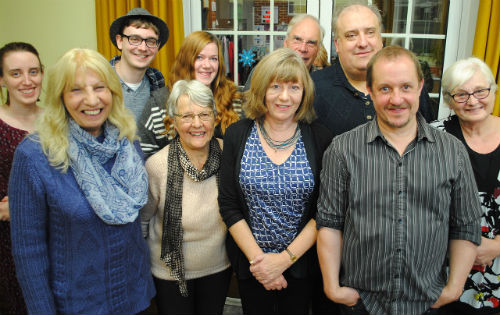
A picture taken with Rushmoor Writers after doing a presentation
I usually charge for doing this. I’ve been paid anywhere from £0 to £300 a day. I’ve heard, from contacts at schools and universities, that some writers charge a lot more than this. Still, I’m happy with anything at the moment as I'm still building my contacts and developing my service offering.
I've even undertaken this kind of work for free locally, because some schools don’t have the budget to pay authors to come in and talk to their students. I just use the opportunity to try new material, promote my website and the books and services I offer. Doing talks is good for branding and advertises what I do through word of mouth.
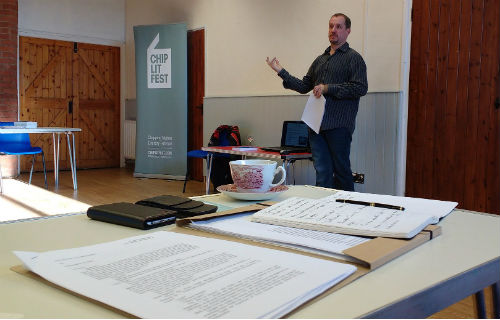
Talking about short story writing at Chipping Norton Literary Festival
Preparing talks can be very time consuming, but once they are prepared, you can usually tweak them for future presentations. I also find that attendees will often buy copies of my books after I’ve presented. This can generate further income. If you’re working without charging a fee, it can make the day worthwhile. If you’re receiving a fee, it can boost your income and make the work very lucrative.
Presentations and talks can be a great source of income, if you can get regular work. I’m actively looking for more opportunities to undertake presentations all the time. I built an author talks page recently, describing this service in more detail.
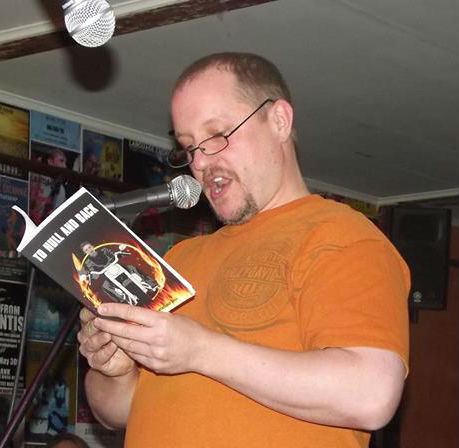
Reading at the Bristol Festival of Literature, back when I was fat more cuddly
It’s great fun – you get to meet some amazing people. I recently did a presentation at St Mary's Church of England VA Primary School. The imaginations of children and their enthusiasm for creating stories and characters is infectious. It was truly inspiring.
At present, I only do one or two paid presentations a month. This means that, on average, this income stream generates around £200 of income a month. This figure will rise substantially as I get more presentations booked in. There is a lot of potential for generating a steady income by developing this service.
Due to the success of the writing competition lists in the writing advice section of my website, I decided that it would be sensible to start running my own competition. I launched the To Hull And Back humorous short story contest in 2014. It offers the greatest literary prize in the known macrocosm. I’m not biased at all. Honest. You can learn all about that, and the history of the competition, on the main To Hull And Back page.
To Hull & Back winner's video
To Hull And Back is great for publicity. It grows every year and generates a lot of interest in my website. This year, it's on target to turnover in excess of £2,000. However, it doesn’t make any profit.
I charge an entry fee. And I make money selling the anthologies. But, I increase the prize pot every year. There are now 20 cash prizes on offer. My aim is to give a 5 figure top prize at some point in the (hopefully not too distant) future. Because of this, all the revenue generated from entry fees and book sales is reinvested in the competition.
That said, I can see To Hull And Back making a profit in years to come. It needs to – in total, it takes about 2 months out of my year: administering the competition, advertising the competition, reading the stories entered (over 1 million words each year), editing and publishing the anthology, organising the anthology launch, doing the ride to Hull… it’s very time consuming. I need income for those 2 months so I can afford to live. In addition to that, this year I've had to pause my critiquing service to manage all the reading, so it's actually impacting services that do generate income.
The competition is becoming more prestigious, so I hope it will turn a profit one day. I’m also hoping to be able to gain some sponsorship that might help the contest grow more quickly.
It’s a labour of love really. I’m just proud to have launched a platform for humorous writing. It’s helping to get the style/genre more exposure, interest and a larger readership.
Whatever you do, competitions are good for publicity, as long as they sit well with what your website offers and your audience. Due to my focus on short stories, a short fiction competition makes perfect sense for me. And, it's a lot of fun to run.
I write a lot of short stories. They often win prizes in competitions and are published regularly in magazines. They have also been performed at reading events and on the radio.
Payment varies a lot. Sometimes you’ll be shortlisted in a competition and receive no monetary compensation. Sometimes you’ll be published in magazines that aren’t in a position to offer payment.
Me, reading my short story 'Death of a Superhero' at the Bristol Festival of Literature
In my opinion, it is still worth considering these kinds of opportunities. It gets your writing in front of new readers and can be a great way of marketing your stories, your website and, therefore, growing your audience. I just research any market I submit to carefully, making sure they have a decent readership before I submit. Then, if I am published, it’s worthwhile, even if I don’t get paid.
That said, I’m often paid for stories as well. The smallest payment I’ve ever received is $2. The highest is £300. These are for stories that range from 500 to 6,000 words in length.
On average, I make around £100 from writing short stories a month. This does vary considerably though - it always seems to come in gluts.
There is a lot more in-depth discussion about this, including real-life case studies, in my book, How to Write a Short Story, Get Published and Make Money.
The writing challenges I run operate in a similar way to To Hull And Back. However, the challenges aren't a competition. There is no entry fee. Everyone who submits wins, because every story received is published.
The challenges do generate money through anthology sales. As I’ve already mentioned earlier in the post, the vast majority of profit from book sales goes to charity. At the moment, they generate anywhere from £5 to £100 in profit a month. Of that, only around 10% ends up in my pocket. So they don’t really generate any money for me, especially when you consider how much time I sink into them.
Still, like To Hull And Back, they do generate traffic and brand recognition for the website. As a result of running the challenges, my email list grows and they help my site become a supportive writing community through lots of user interaction.
While this exact idea might not work for every blog or website, the general principal can be tweaked for different target audiences. For example, if you run a travel blog, you could challenge people to take a photograph of themselves in front of a famous landmark and send them to you for publication in a photobook. There are many ways to involve your audience in your website and what you do.
I sometimes write for other blogs and websites. You can find details of a lot of the posts I’ve written in my blog post portfolio.
On average, I earn about £25 a month writing for other blogs. To date, the most I’ve been paid to write a guest blog post for someone else's website is £100. You can charge a lot more than that, if you can guarantee publication on a prestigious website like The Huffington Post for example, or if you have a huge audience. In the niche of short story writing, the audience is limited, so I have to be realistic about what I'm likely to be paid.
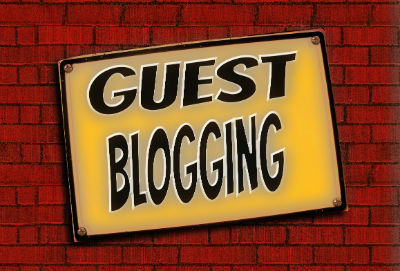
Again, I have written for free. Even if I’m not paid, there is still value in writing for other blogs. By writing for other websites, I can be exposed to a new audience. For example, I've written for John Yeoman on the Writers’ Village website. As I'm sure many readers will know, John died last year and the WV site doesn’t exist anymore. But I use it as an example here because John had a large audience. Because I wrote for him, they found out about my website. After writing for him, I received a lot of visits and communication from his audience. It was well worth writing the post.
It was the same when I wrote for Matthew Woodward’s blog. Matt runs a digital marketing blog and invited me to write about self-publishing because a lot of digital marketers are interested in it. I agreed. He has a huge email list. At the time, he had around 50,000 subscribers. When he published my post, he sent an email out to his list. Because of that, I got exposure to a huge audience.
Off the back of that, I was offered other guest writing opportunities. One was by Dave Chesson at Kindlepreneur. As I mentioned earlier, I now work with Dave as an affiliate. That’s how I got to know him. As you can see, undertaking this kind of work creates opportunity. It opens doors. Even if there is no monetary payment involved, I always consider guest opportunities carefully. They can hold a lot of hidden value, beyond financial payment.

By writing posts, you can also gain links to your website. Links are valuable as it’s one of the things Google looks at, when it’s determining how popular your website is and, therefore, how they should rank it on their search-results pages. Any link on a relevant and popular website is going to help your blog’s performance.
I also write a lot of non-fiction for my blog. Yep, this post is a fine example. Every post I write is indexed by Google and other search engines. If the post is well written and relevant to my niche, over time Google will start displaying it when users search for queries relevant to the post. EG, ‘how to make money blogging’. Every post I publish generates more traffic for my website.
All the resources I’ve mentioned in this post generate visits to my website. The more visits I receive, the more adverts get displayed. The more adverts that are clicked, the more money I make. That rule can be applied to every piece of content I publish. It’s all about volume. This is why many blogs have 1,000s of pages. It’s a way of generating more visits and, therefore, more revenue.
Currently, my website only has around 180 pages. From that, I generate about 30,000 visits a month. Imagine if I had 1,000 pages, or 10,000... Visits would be higher and therefore, all my income streams would increase too. That's why I publish content regularly.
I tend to write long posts, like this one (it’s over 14,000 words), rather than lots of short posts. Longer posts tend to perform better over time as they’re more informative and will generate more visitors because they will be relevant to more search terms. Still, I’m thinking of writing shorter posts more often, like the one I wrote about the length of short stories. This post is only 153 words in length, but it answers questions that are searched for a lot on Google:
Therefore, it receives a lot of visits and gives the user what they’re looking for – an answer. I intend to research more questions that are regularly asked and start making pages that answer them. It seems like a good way of generating more visits and more money from advertising.
I’m currently researching and planning a short story writing course. I think this will be of interest to my users. I plan to create videos and downloads that help students become published authors. The ticket price of the course is likely to be quite high, but that’s because I plan to offer:
It’s a work in progress, but I think it could be a great way of generating income and offering excellent value to anyone who signs up.
Whatever your niche, developing a course could be a good way of making a living from your blog. Again, let's use Dave at Kindlepreneur as an example. He offers a free Amazon ads video course. Many bloggers do something similar. Some charge for their courses. Others, like Dave, offer free courses and upsell other items to people who sign up.
So developing a course is something I intend to pursue.
UPDATE Jan 2019: It took a year to write, film, integrate into the website and launch, but my short story writing course is now live. There is a comprehensive course and a free course, so students can see if they like my teaching style before making a purchase.
For more information, please visit the all new Learn section of my website.
I wrote this post after being contacted by a number of different people on my email list. They all encouraged me to write about my experiences of quitting work to become a writer. They wanted to know what lead me to do it and how it changed my life.
I'd like to say a special thank you to Agnes Marcelo who was the first person to ask me to do this. She sent me this message almost immediately after I'd sent out a newsletter to my email list, which included a note about me quitting my job to run my blog fulltime. Her message read:
Oh Chris, do write about your BIG DECISION of giving up your job to pursue your passion. It gives me goose bumps when I read it as I am at a similar crossroad. Will you please? As your avid reader and follower, I am most interested to know the inside story.
I knew it would be a long post, so put it off for a while. One, because I needed time to invest in the post and I was busy with other projects. Two, because I thought the post would be of more interest after a year had passed and I’d had time to investigate more ways of making a living out of the blog - it would cover more of the journey and therefore be of more value to readers.
So, I'm sorry it's taken me 16 months to get around to doing this, but I'm pleased to have it finished at last.

I hope this post is both inspiring and interesting. As you can see, I have a long way to go to make a sustainable living from my blog and writing. That said, I’ve embarked on a long journey and I’m determined to complete the adventure and make it work. And, I’m loving the experience so far.
The results to date are very encouraging and I think I’ll be earning a good living from what I do in the near future.
If you look at the 11 different ways of making money I've mentioned in this post, I am now generating the following average income each month:
The total is £1,212 a month. This is a gross amount, before expenses are deducted, so my NET profit is much lower, as I mentioned at the beginning of this section. Still, it's looking promising and the figures are moving in the right direction – upwards.
To help make ends meet, I have my finger in a few more proverbial pies...
I was also a founding trustee of the Arkbound Foundation. This is a charity, so the work I do is voluntary, but it's a good cause. The project gained charity status in 2017. Here is a link to the Arkbound Foundation website.
The foundation has been set up to run mentoring programmes for writers from disadvantaged backgrounds. They have already received their first grant and, if the initial projects go well, the future looks incredibly promising. You can find out more about Arkbound on my About page.
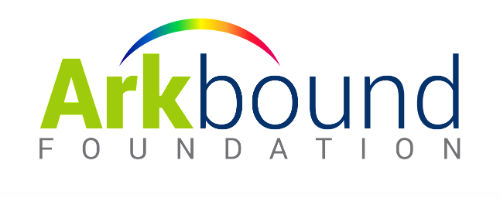
As with everything you try to achieve in life, you just have to ignore the Demon of Doubt and believe in yourself. Making a living from writing is possible. It can happen. It will happen. I’m going to make it happen. I love what I'm doing and am much happier and healthier than I was when I was working. I've made the right decision for me.
If you have any questions about any of the points raised in this post, please get in touch. You can find all my contact details on my contact page, or you can simply fill in the comments form below.
Many thanks for reading all the way to the end of this epic post. If you like, you can send me a message simply saying ‘I made it to the summit’.
I will then shower you with the praise you deserve for reading the words I slaved over in my van in different locations around the mountainous regions of Wales. Thanking you in advance.
Cheers me dears, Chris
Agnes M
CHRIS! You finally wrote what I had long been waiting to read... thank you for doing it for me and for your avid followers. It is a long read so I will read it s-l-o-w to enjoy the whole story.
I am pleased to tell you that Jill is junior-college bound and she got a MERIT SCHOLARSHIP on writing... imagine that! I know that your personal interest and encouragement made her believe she can write... for this I thank you... We call you her writing mentor even if you never knew. Hahahaha!
I will read your post line by line as it speaks to me. It pushes me to believe that there is life after a day job.
Chris Fielden
Thanks Agnes.
That’s great news about Jill’s scholarship – please pass on my congratulations to her :-)
And I’m very proud to be referred to as her mentor, even if I didn’t know about it!
Steph M
Very interesting and inspiring post, Chris. Fab van too :-)
Chris Fielden
Thanks Steph :-)
Natalie C
Great that you are so upfront about everything, very interesting!
Kath D
I made it to the summit and enjoyed every word. Super story and an inspiring journey. You should be very proud of yourself xx
Chris Fielden
Thanks Kath and Natalie :-)
Ros B
I made it to the summit (tho' I skipped over a bit in the middle!)
Chris Fielden
Ros, you are a LEGEND, even if you did skip the middle bit :-)
Thank you for your support and donation - it's very much appreciated.
Bridgett K
Thanks for all this Christopher. I'm not looking to make a living from writing (I'm a lucky pensioner), but for some time I've received your emails and I bought How to Write a Short Story - which I need to re-read. I also once entered To Hull and Back, but clearly didn't raise much of a laugh.
I admire your tenacity and resourcefulness, let alone the sheer hard work involved. How on earth do you organise each day?
Also, your blog style is very readable, with so much information backed up by personal anecdotes and evidence, and all in a light-hearted spirit.
So really, I'm just saying I really hope all your hard work pays off, and thank you for the range of services you discuss and provide.
Chris Fielden
Hi Bridgett. Thank you so much for your kind words and your donation. Both are very much appreciated :-)
I receive so many good stories into To Hull And Back each year... it's very difficult to select a longlist, let alone a shortlist! I always have to make tough decisions, so please don't be disheartened if you weren't selected. If I was able to, I'd give everyone a prize. This year is no exception - the stories I've received are excellent and they can't all win. I'm sure many of the ones that don't make the shortlist will go on to do great things elsewhere.
Anyway. Thanks again. I wish you all the best with your writing.
Chez C
I made it to the summit... didn't like the £0 on the PayPal donation, so here's a small offering to say thank you for sharing. Really appreciated the honesty and openness.
Chris Fielden
Hi Chez. Thank you so much for your donation – it really is very much appreciated.
I've updated the 'donations' section of the post to say that donation buttons do work, if they are placed well on a website :-)
Chez C
Dear Chris. Glad you got it - found the blog very inspiring. Hope the donations come flooding in. All the best.
Glen D
Hi Chris. You are definitely an example of someone who is basking in the glow of the cosmic headlights, aka living the dream.
Bouquets and rainbows to you and keep on keeping on!
Glen D, Brisbane, Australia
PS. As a final word I want to reassure you, that when you finally decide to pull the plug on running the various writing competitions that raise money for charity but don't really provide you with any/much income and take so much time to keep afloat and administer, no one, literally no one will begrudge you of that. You've already proven yourself a community-minded humanitairian many times over to this point.
Chris Fielden
Hi Glen. Thank you for your kind words - they really are very much appreciated.
I'm hoping that I get to a point where I can employ other people to help me run the site. If I can leverage the advertising and affiliate work this might be doable. If that does happen, the challenges and charity work can stay open indefinitely, financed by the other income streams. We shall see. I have to get to a point where I can pay myself properly first, but hey... no harm in planning ahead and having a vision :-)
Anyway. Thanks again - I hope all is good with you and your writing.
Helen FR
I have just read your email regarding your writing journey and this has inspired me to sell my house and either buy a caravan or maybe rent a small country cottage or buy a static caravan. Unfortunately, I don't think I will be making a huge profit from the sale, but I have decided it is about time I did what I want to do and not what society expects me to do. Roll on Monday morning when I will be visiting the estate agents. I've made the decision and there is no going back.
I am still attending the creative writing class and accordingto my tutor, my writing skills are improving. I haven't submitted any more stories to women's magazines, as I have been too busy at work, another reason to sell up and move on.
Thank you again for sharing your story with me and hundreds of other people. You have the life I want and at the minute I am so jealousbut I too will live the dream, once I find a buyer for the house.
Best wishes.
Chris Fielden
Hi Helen. I'm glad you found the post inspiring – thanks for letting me know. And I'm so pleased to hear about the decision you've made. Congratulations! That's really exciting, and very brave of you. I hope you find what you're looking for.
I'm glad to hear your creative writing is going well too.
Good luck with finding a buyer for your house. I'll look forward to hearing from you when it's sold and you've found a new place :-)
Helen FR
I have put my house on the market. I'm on a roll and there is nothing going to stop me doing what I want to do.
Chris Fielden
Fabulous stuff, Helen – I hope the house sale goes well!
John N
Chris, just finished reading your masterpiece (it's 12.45 am), although I do admit I skipped a couple of places, and have to congratulate you on the time and effort you have put in to advise and encourage your host of followers. You are an inspiration to all of us and I am sure you will be rewarded in due course, even if you have to wait until you get to heaven. All success to you.
Chris Fielden
12.45am... wow! I can only apologise for keeping you up until the wee hours :-)
Thank you so much for your kind words - they're very much appreciated.
Martin S
Wow. Loved your candid blogpiece about your recent life history, mobile office, rebuilding of bridges with your Mum (bet she's thrilled to have your drum kit back), etc etc etc. I always thought I was odd, but you have tipped me into a cocked beany hat of oddness - you know, one of those with a propeller at the top.
Chris Fielden
Ha! Thanks Martin. I will take that as a compliment :-)
Maris M
Hi Chris. I read your blog with interest. Congratulations on taking control of your life, and I sincerely hope that it turns out well for you!
I, too, am trying to make some money from my writing. I have had two novella published (commercially) one of which won a prestigious prize but only sold around 2000 copies, alas. The other was published by a very small publisher who, in spite of their early promises, did nothing to arrange distribution of print copies, or to do any promotion bar a blog tour. My royalty payment from her amounted to $43. The book that’s at present with Inkitt seems to be going well, but I’ll wait and see (while going on promoting it where I can).
For the past couple of years I’ve mainly concentrated on short stories, winning a few competitions and I’ve had a few published in print or online, but haven’t had any success lately. I did have a contract with a small US publisher for a collection of my stories, but they closed down. I’ve had very encouraging rejection letters from such bodies as The New Yorker, EQMM and (repeatedly) The Glimmer Train, so I keep on trying.
Your lists of competitions has been very helpful, so please keep it up!
Best wishes, and if I had any spare money I’d send you some!
Chris Fielden
Thanks for your kind words, Maris – very much appreciated :-)
Congratulations on your publishing success. It sounds like you’re doing really well. Your experiences with sales and small publishers are all too familiar. Due to self-publishing, anyone can publish a book now. However, generating sales is really tough and requires a lot of work – lots of trial and error. Writers and publishers need to invest money and time into marketing to make their books stand out in a saturated market where there is SO much competition and choice. It ain’t easy. Still, it’s lots of fun trying.
It sounds like you’re doing everything right, though. And it’s good that you’re receiving encouraging rejections, especially from renowned publications like the New Yorker.
I’ll be interested to hear how you get on with Inkitt – I hope that works well for you.
I wish you all the best with your writing endeavours and thank you for your continued correspondence.
Tony T
Thanks, Chris, I made it to the summit and I'm just going to enjoy the view for a moment before I set off on the black run of my next writing.
I'll be using your excellent blogs, advice and links so look forward to sharing tales of success!
All the best.
Chris Fielden
Great stuff, thanks Tony - congratulations on completing the epic read and I hope you enjoy the view :-)
Good luck with your writing. I'll look forward to hearing your tales of success in the future. Maybe you could write about them for my blog?
Karo J
Hi Chris, reading this post is really inspiring. I seem to be in the position you were with work and having no time for your personal writing and stuff.
I'm trying to make that decision of making the move while weighing the consequesnses. I have bookmarked the page. I will read it over and over again and maybe drop a comment again about my decision.
Thanks for taking out time to write this.
Chris Fielden
Hi Karo. Thanks for your message. I'm glad to hear you found the post inspiring.
You'll be pleased to hear that I'm making more money out of the website now, so it is growing. However, it still isn't enough to live from.
I've almost finished developing the writing course that I mentioned in the post, and plan to release that by the end of the year (it took a lot longer than I expected). I'm hoping that will earn me enough money to live off (market research suggests it has a good chance). I will add to the post, probably next year, and share how that worked out for me.
I have to say that giving up work and becoming self-employed is one of the best decisions I've ever made. I don't have as much money, but I am much happier. I hope that helps you with your decision :-)
Franklin
Nice post.
Chris Fielden
Thanks Franklin, glad you liked it :)
Angela G
I made it to the summit, and I didn't skip any bit. Thank you for the help you provide new and emerging writers. Your website was like gold for me when I started.
Chris Fielden
That's awesome, thank you Angela!
It's always nice to hear the site has helped writers on their journey :-)
I hope your writing is continuing to flourish.
Festus K
Initially, I didn't intend to read through the post... Just wanted to sort of check it out but I guess my curiosity, as well as the quality... potency... potential of the post hooked me and I read on... though as a result, I probably skipped [some of ] the earlier part(s) and others along the way / at the end... But I believe I got the essence of the message and picked up more than one useful point from it.
Well... What can I say? Hats off (incuding my imaginary one)!
Chris Fielden
Thanks Festus, much appreciated :-)
Leave your comments
Please use the form below to leave your comments. All comments will be reviewed so won't appear on the page instantly. I will not share your details with anyone else. Most recent comments appear at the bottom of the page, oldest at the top.